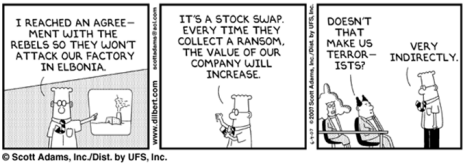Philosophy
This page is about my personal philosophy, as it relates to my
professional life. I try to be explicit about
life goals, and then ask how I will pursue them.

Duties
The way I define my professional life is primarily based on three
duties:
- Duty to those who pay my salary: provide value in exchange for
value.
- Duty to the larger social world: work to improve our collective
lot in life.
- Duty to myself: perform meaningful work. A test: when I am
dying, I want to be able to look back at my professional life and
say, "I did something that mattered."
Over the course of my thirty years as a
congregational rabbi, I have seen many people come to the end of their
lives… Most people are not afraid of dying; they are afraid of not
having lived… What frightens them … is the dread of insignificance, the
notion that they will be born and live and one day die and none of it
will matter.
Kushner, H. (2001). Living a Life That Matters, p 146
Implementation: Research
I try to do research that fulfills all three duties. It try to use my
signature strengths:
- Technical skills.
- Some expertise in cognitive and social psychology.
- Training in research methods.
- An interest in philosophy, particularly ethics.
- A general background in business.
Publishability in top MIS journals is not a criterion.
The main research topic I have chosen is ethical decision support
systems, software that helps groups in companies make decisions on
difficult ethical issues. See the
Research page for details.
Implementation: Teaching
I have done some research on how universities might encourage
students to think about their own personal philosophy. Here are some
links:
Do Our Students Want Values Programs?
Values programs are easier to justify if students actually want
to participate in them. We analyzed data from the 2001 Cooperative
Institutional Research Program (CIRP) survey administered at Oakland
University. About a third of the students thought that developing a
meaningful philosophy of life was important. These students were
somewhat more socially active, focused on individual intellectual
pursuits, politically liberal, and spiritual than other students.
They thought that individuals can change society. Students
interested in philosophy of life don't appear to be more religious
than other students. On average, black students were more interested
in developing a meaningful philosophy of life than white students.

Elements of Moral Maturity
This paper offers an image of moral maturity that consists of
seven elements: moral agency, harnessing cognitive ability,
harnessing emotional resources, using social skill, using
principles, respecting others, and developing a sense of meaning.
The description can be used to start campus conversations on the
goals of moral development programs.
Factors Predicting Intention to Enroll in a Philosophy of Life Course
This study used the theory of planned behavior to examine university students' intentions
to enroll in a philosophy of life course. Students focused primarily on course outcomes.
They wanted the course to help them understand life, themselves, and other's
perspectives, but were concerned that instructors would have too much influence on their
beliefs. To a lesser extent, students' perceptions of other peoples' views affected their
intentions, especially the opinions of parents, friends, and religious people. Some
students thought all beliefs are subjective, and discussing them would be pointless.
"We Don't Need No Stinking Ethics": The Struggle Continues
Some business faculty think that teaching ethics is a waste of time.
Others think that teaching ethics might do students harm. Objections
include "Values are formed in childhood and cannot be changed,"
"Nobody has the right to tell others what is ethical," and
"Employers don't care about ethics." This paper offers a brief
response to each objection, and presents supporting evidence. It is
organized as a set of notes one might use in a debate.
Sneaking a Philosophical Camel into a Business Tent: Labeling the
Summum Bonum for Business Students
 Many
students focus on financial security as the most important outcome
of their university education. Students who are single-minded in
their pursuit of financial goals may come to realize later in life
that the philosophical assumptions underlying this choice may not
have served them well. Educators wanting to help students become
informed, independent decision makers might ask how they can
introduce materially focused students to deeper issues. Discussions
of philosophical terms like the summum bonum—the greatest good—might
be resisted by students, if they think the terms are inappropriate
for business courses. This study examined whether the term "personal
success" would be an acceptable substitute. A survey of
undergraduate business students found that on average they thought
about the summum bonum more than expected. The data also showed that
students deemed standard philosophical terms inappropriate for a
business class. "Personal success" was judged appropriate, though
not as much as pure business terms like "strategy" or "leadership."
Analysis also suggested that thinking about ethics and the summum
bonum was not driven entirely by interest in religion or
spirituality. Implications of the results for business ethics
education are discussed. Many
students focus on financial security as the most important outcome
of their university education. Students who are single-minded in
their pursuit of financial goals may come to realize later in life
that the philosophical assumptions underlying this choice may not
have served them well. Educators wanting to help students become
informed, independent decision makers might ask how they can
introduce materially focused students to deeper issues. Discussions
of philosophical terms like the summum bonum—the greatest good—might
be resisted by students, if they think the terms are inappropriate
for business courses. This study examined whether the term "personal
success" would be an acceptable substitute. A survey of
undergraduate business students found that on average they thought
about the summum bonum more than expected. The data also showed that
students deemed standard philosophical terms inappropriate for a
business class. "Personal success" was judged appropriate, though
not as much as pure business terms like "strategy" or "leadership."
Analysis also suggested that thinking about ethics and the summum
bonum was not driven entirely by interest in religion or
spirituality. Implications of the results for business ethics
education are discussed.
More stuff is listed on the research
page.
There are some other things I do in teaching to meet the
duties, such as:
- In introductory MIS classes, use Dioptra as an example of IT
support for unstructured decision making.
- Create pages like this one.
- Talk about this page in class. I don't spend a lot of time on
it, but let students know that life is worth thinking about.

I am only one
But still I am one.
I cannot do everything,
But still I can do something.
And because I cannot do everything
I will not refuse to do the something that I can do.
Edward Everett Hale
Last updated:
Thursday, June 19, 2008
|



